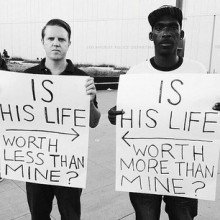When I was at school in the late eighties; aged 11 as a class we were asked to write a report, which would have to be read out to the class about something important to us. We spent the morning writing away, knowing in the afternoon we’d have to stand up in front of our peers & present our work. I wasn’t great a talking aloud, I’m still not really, I had a stammer (which still kicks in when nervous), a lack of self-assurance & confidence which affects most 11 year olds & an anxiety which I didn’t understand back then, that lead to uncontrollable panic attacks. After lunch & as I listened to stories of a brave father, a lovable dog, a grandfather with medals from the war; it was my turn. I stood at the front of the class, nervous, sweating, stuttering & stammering I started.
“I believe apartheid is wrong, judging people because of the colour of their skin before you know the person is not right & is not a world I want to live in. Every person should be judged on their actions, not from your stereotyping. Birth place, skin colour & religion should never define a fellow human being.”
My opening couple of lines left my class mates & teacher dumb struck. To be clear I’m white, working class & I was in a village school in the Cotswolds, in the eighties; we were all white & working class. I was inspired partly, by the Eddie Grant song, ‘Give Me Hope Jo’anna’. We listened to a great variety of music at home & I heard my fair share of protest songs growing up. I didn’t know huge amounts about apartheid, I knew we avoided South African products, I knew about the rebel Cricket tours, that Allan Lamb played for Northamptonshire & England, that Zola Budd ran bare foot in a GB vest rather than completing for her native South Africa, However, until I spent time learning about the Soweto student uprising, I fully started to understand the situation & my disgust that in the modern world this was allowed to happen. I was brave enough to talk about it to my class mates in such a direct manner, were in part to the ‘Free Nelson Mandela’ concert.
By the time I had finished, I had tears rolling down my face, partly the nerves had gotten the better of me & partly due to abuse I’d started to receive. I was called P***i, Ni**a, Ni**a lover. I still have ex school class mates who now nearly 30 years later refer to me as P***i due to my ability to hold a tan well. This is where the black lives matter campaign comes in, apartheid in South Africa wasn’t ended because South African school children took part in peaceful protests (they tried, they died), not because sports people left the country. Change happened because the international community said enough is enough in this day & age we’re not accepting this. It was musicians & celebrities of all colours & nationalities who performed at the ‘Free Nelson Mandela concert’.
Black Lives matter is a campaign I liken to the anti-apartheid movement of the eighties. Most people ignore it, say it is an American issue, and try to defuse it with all lives matter statements. However, it is causing a social split in the States & fear, the fear causes anger which leads to trouble. However, we all need to stand together to highlight the issues; stand with the protestors on the urban streets of America. Show we will not tolerate these injustices.
I will never know what it is like to be a young black man growing up in urban America fearing for his life daily. The same I never truly understood the barriers apartheid caused & division, which are still evident today, in South Africa. However, I understand it is wrong, that things need to change. I’ll continue to promote black lives matter; I’ll continue to debate those who insist to state all lives matter. It might only be a little, but if enough people stand together things can change.
Benjamin Pantling







